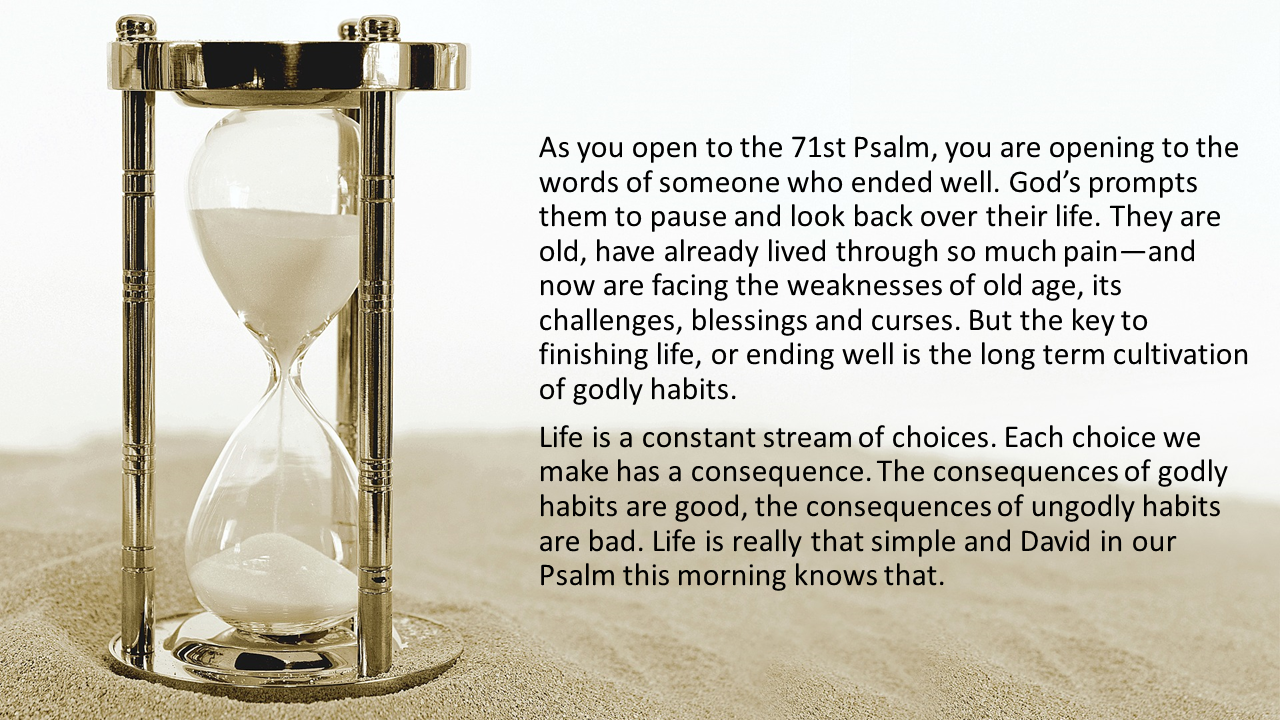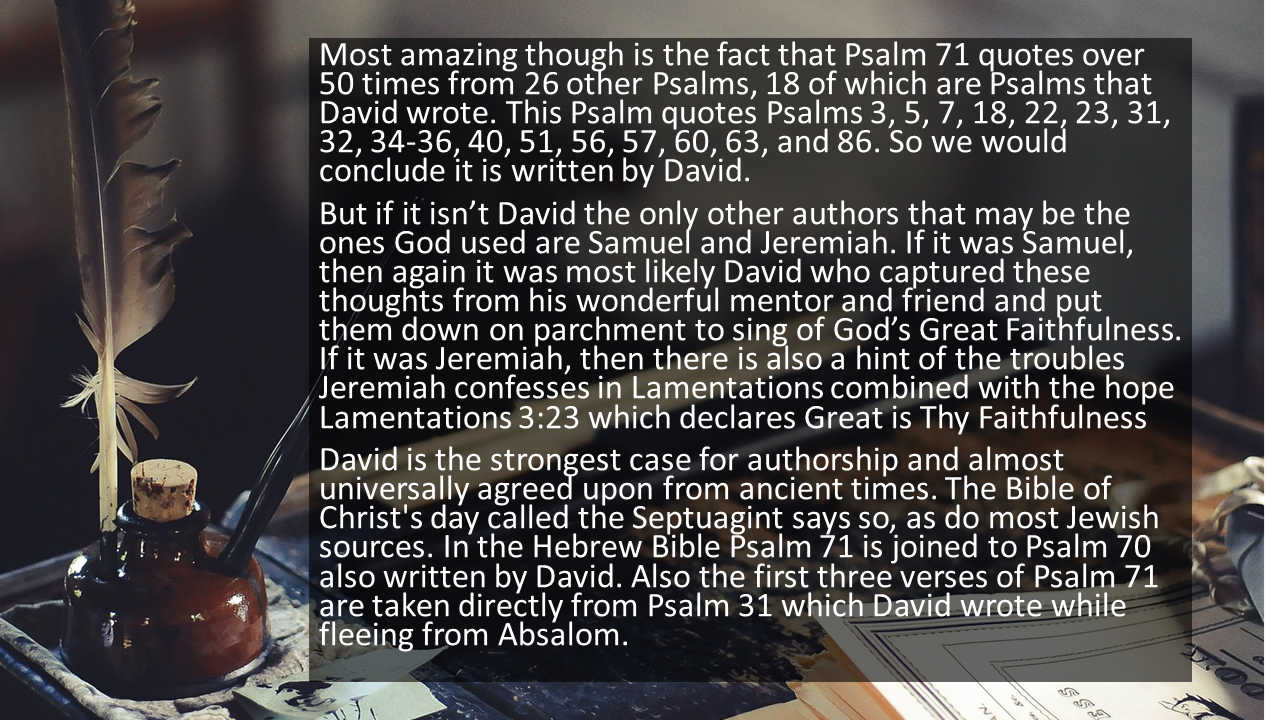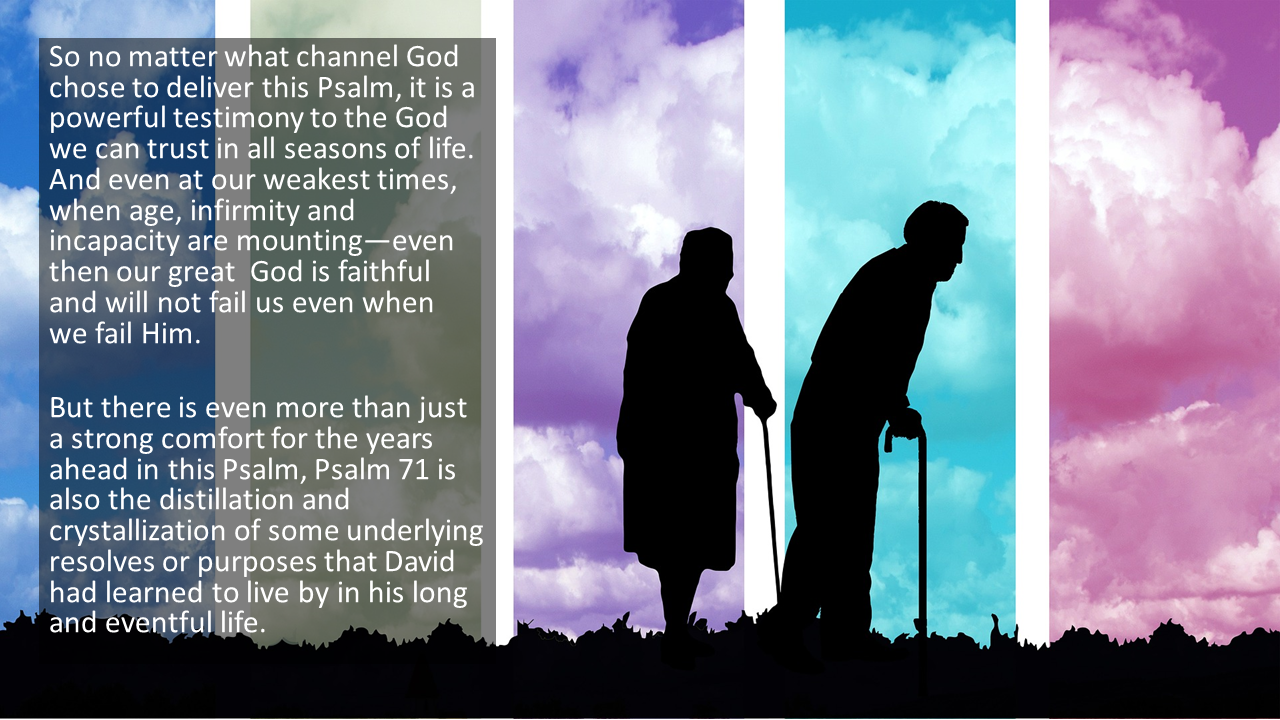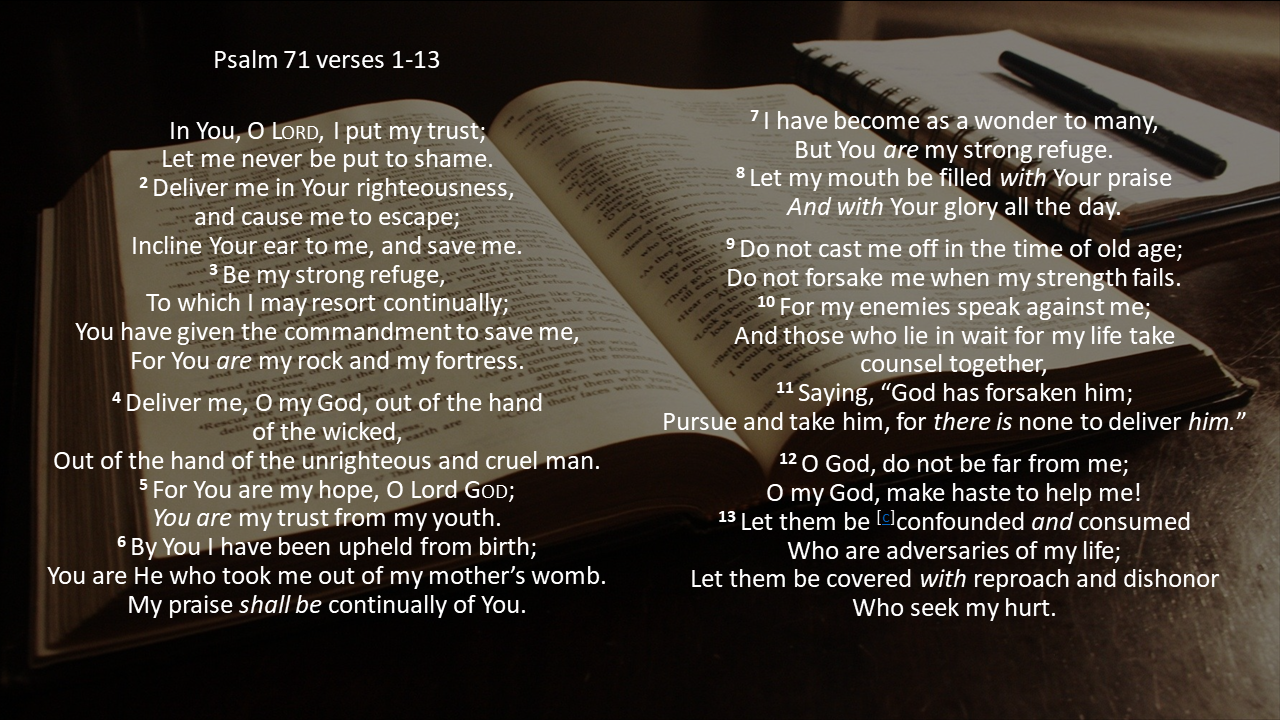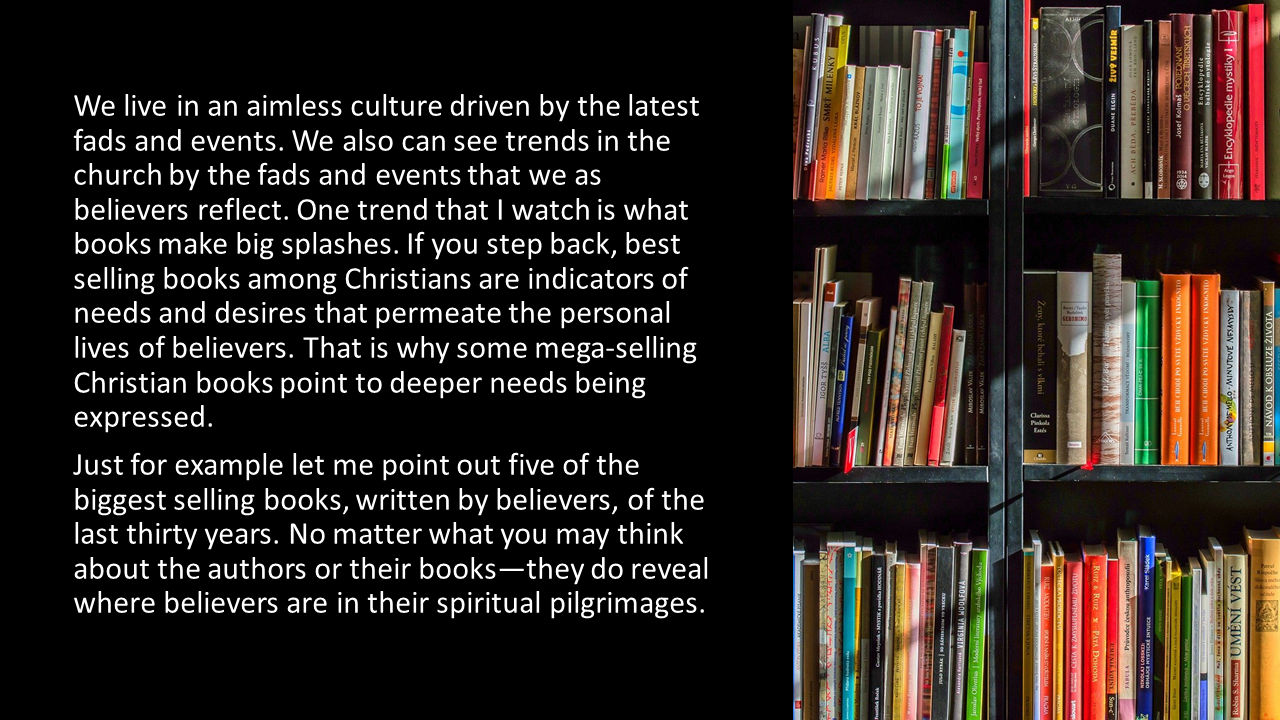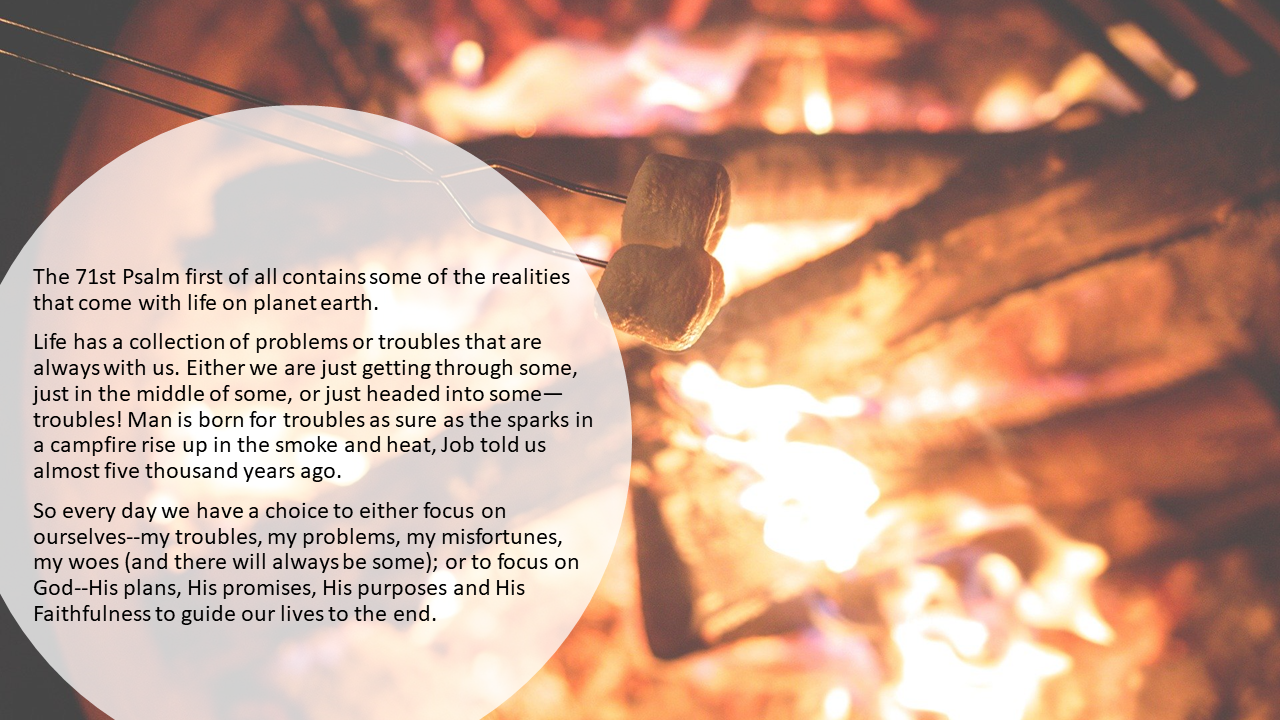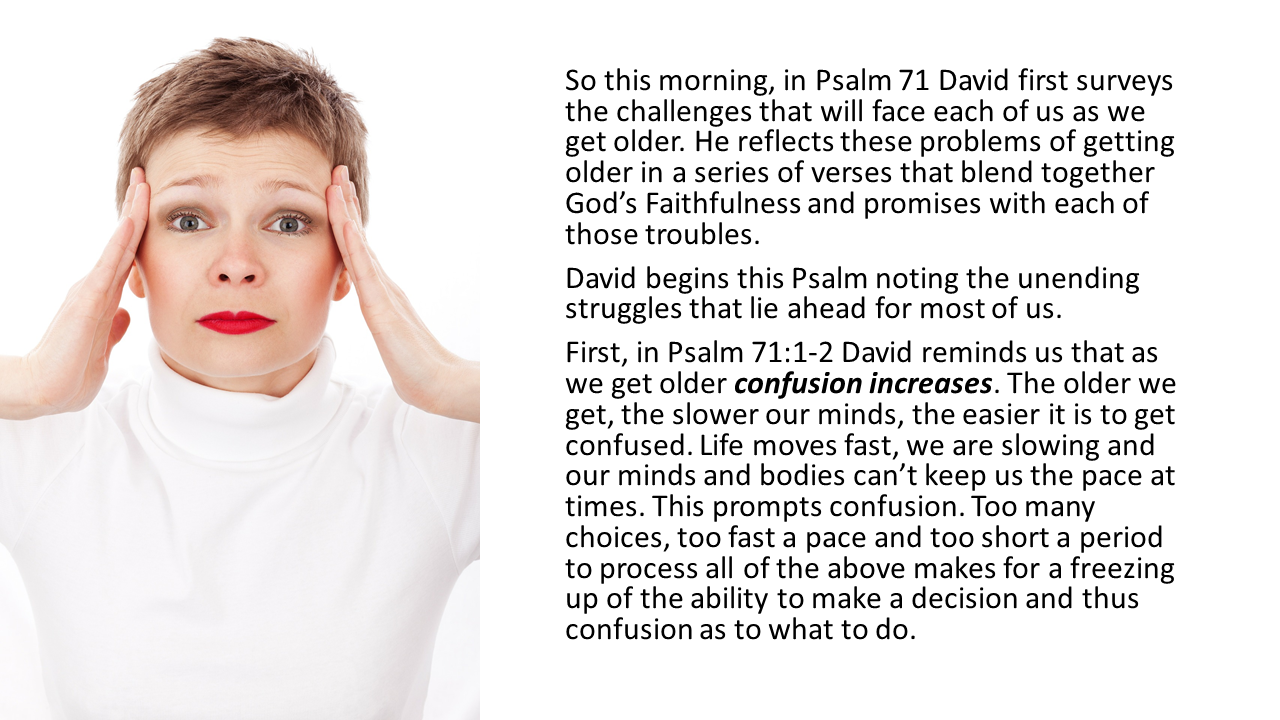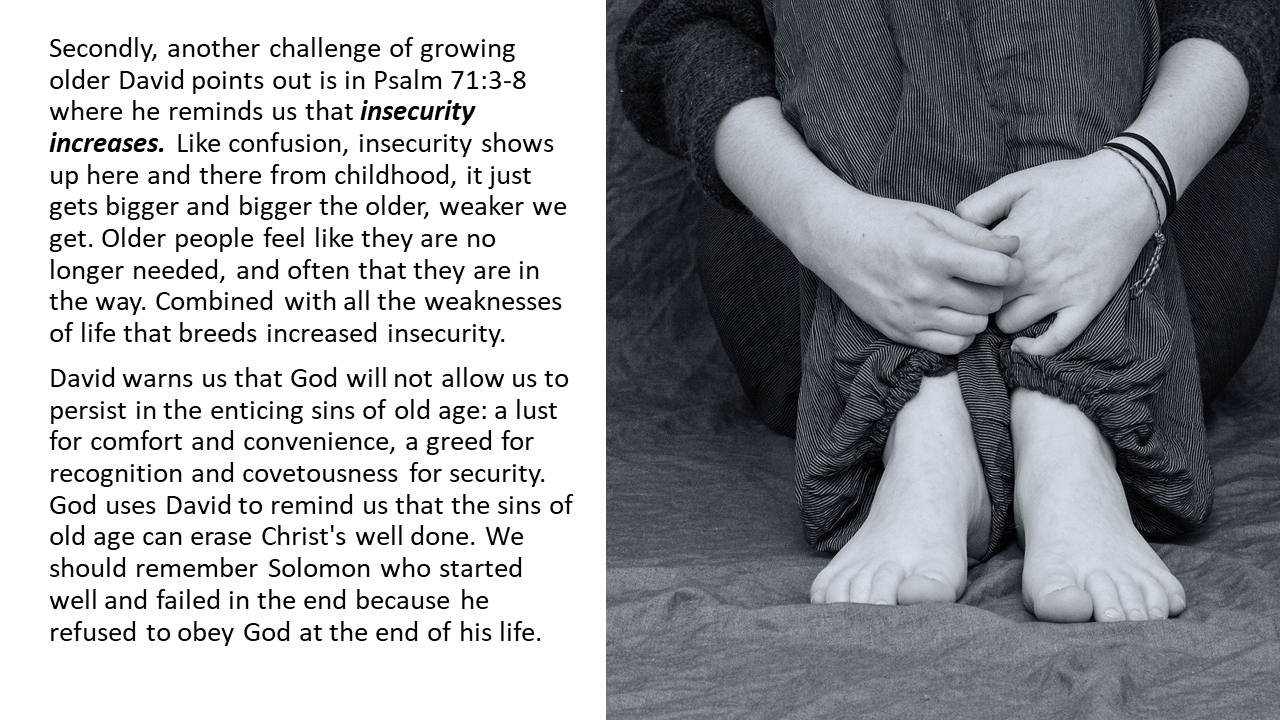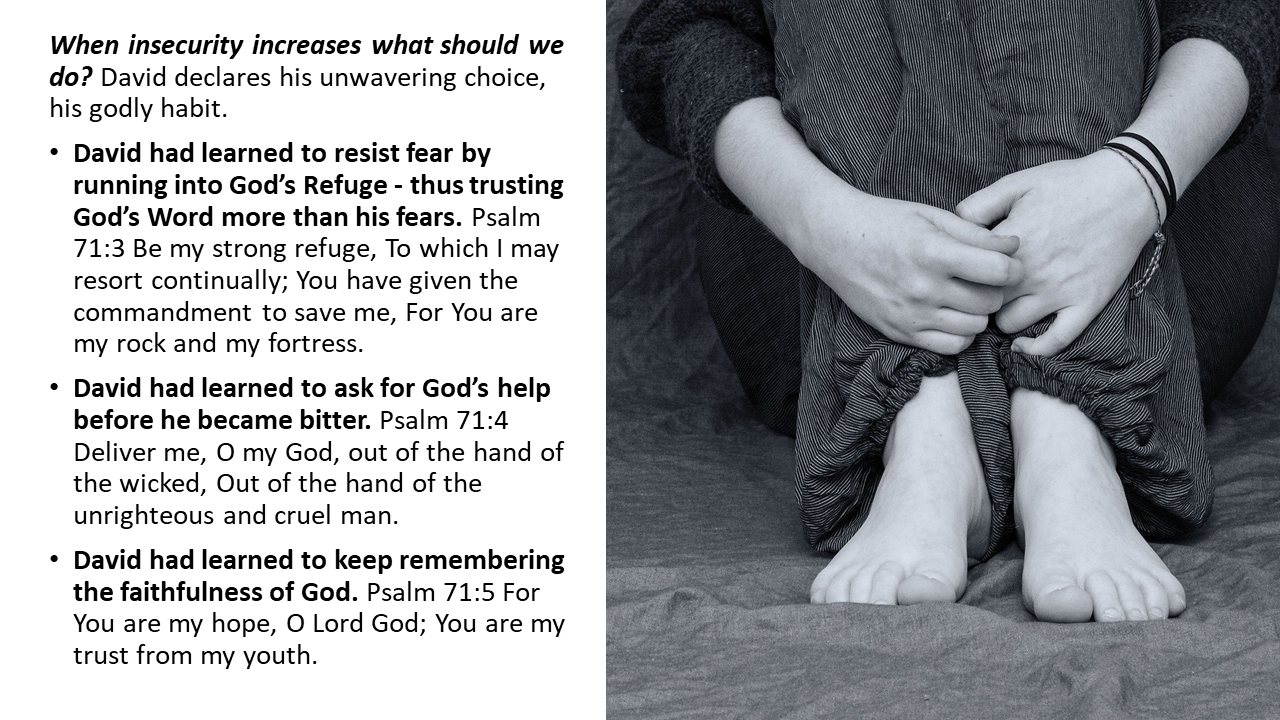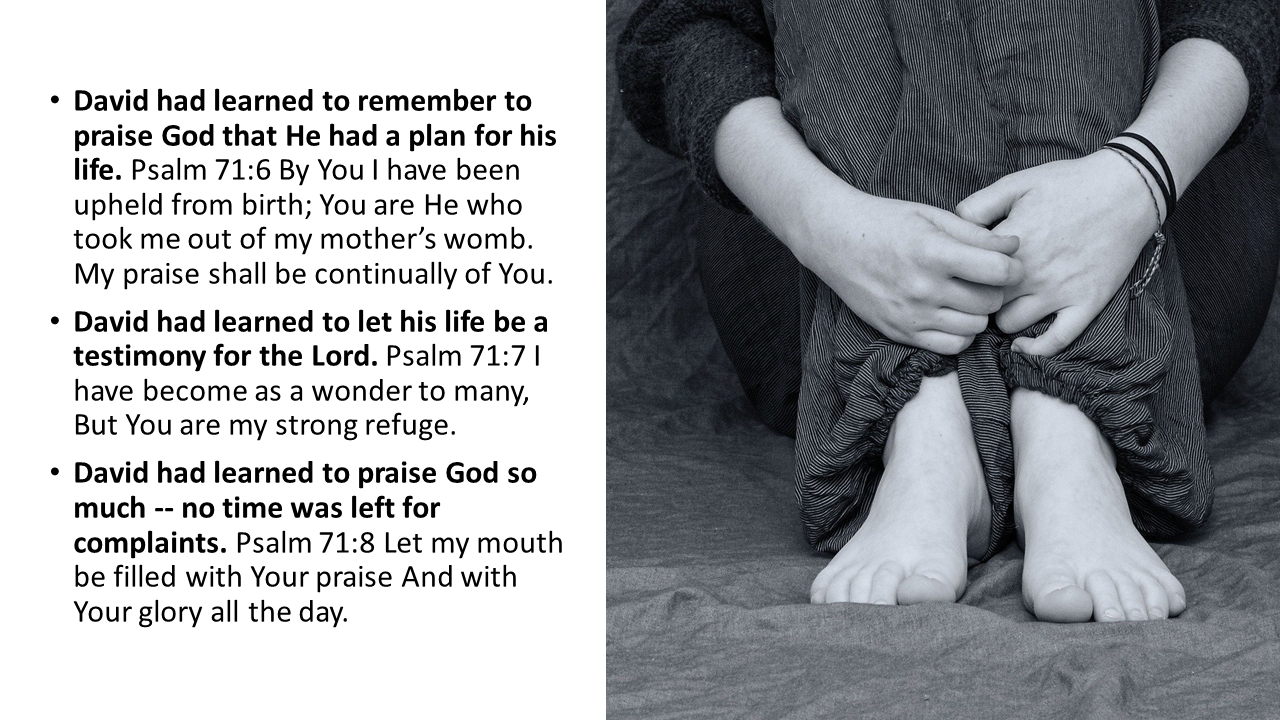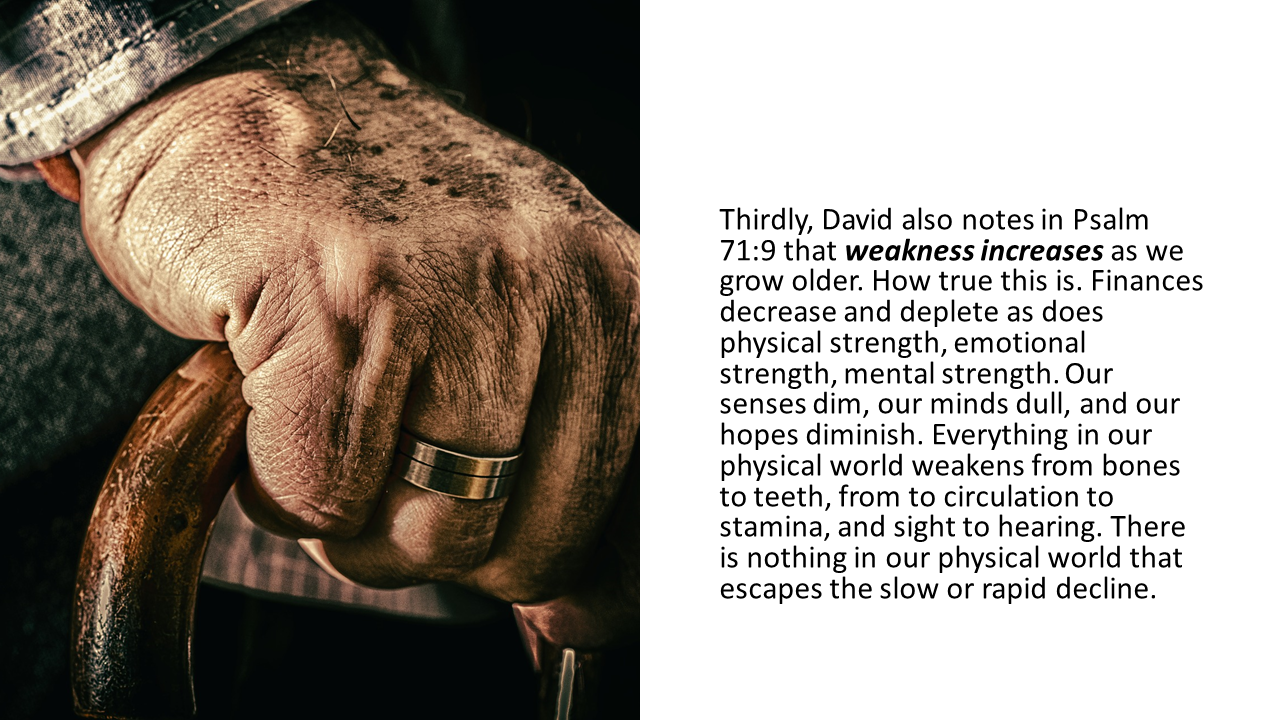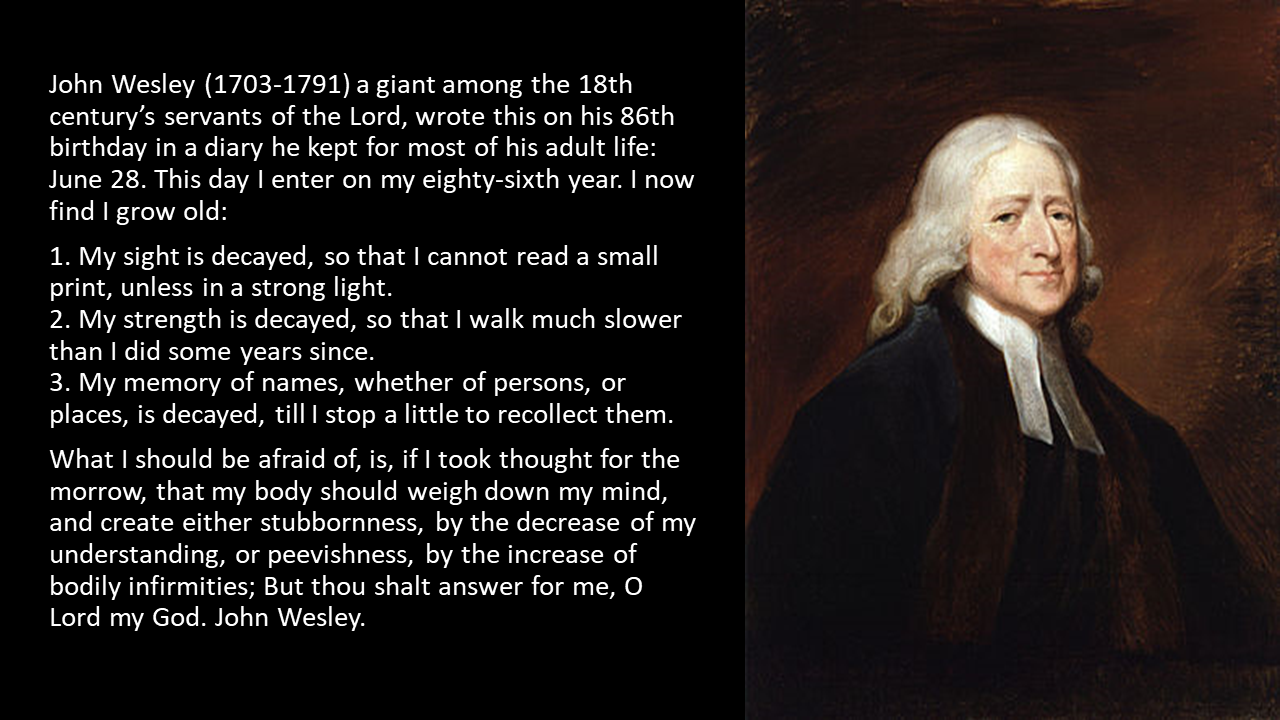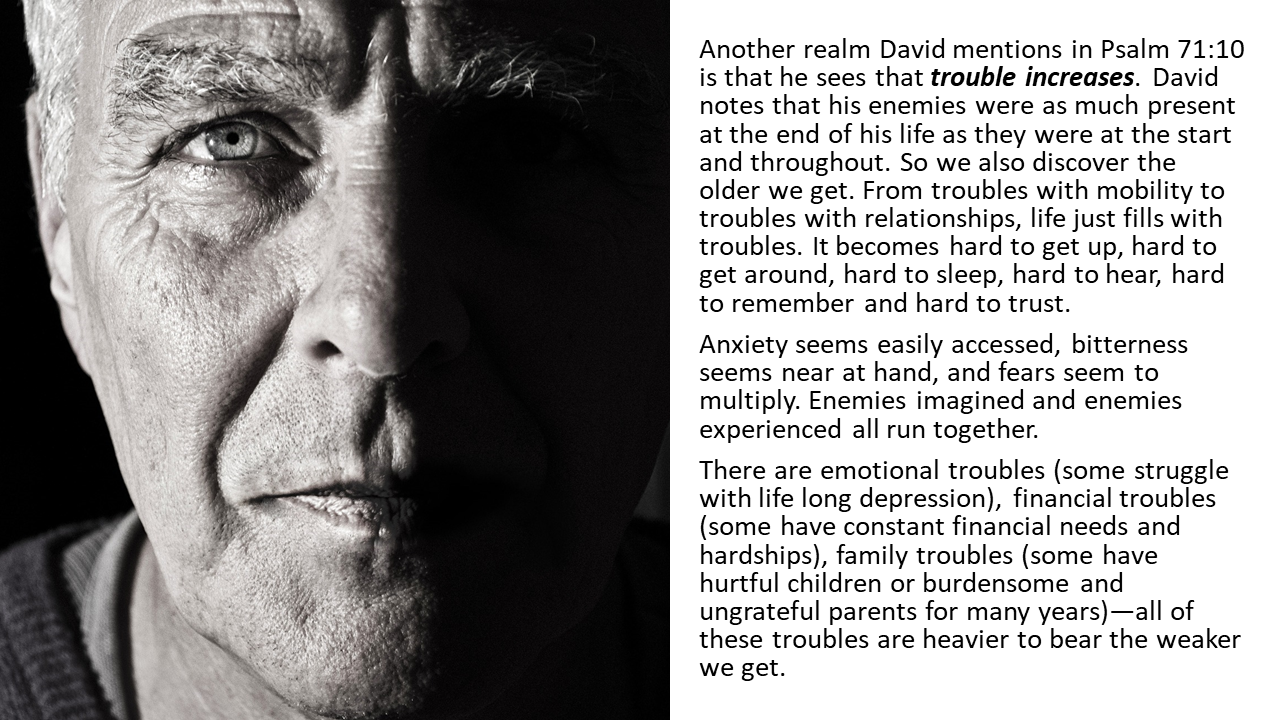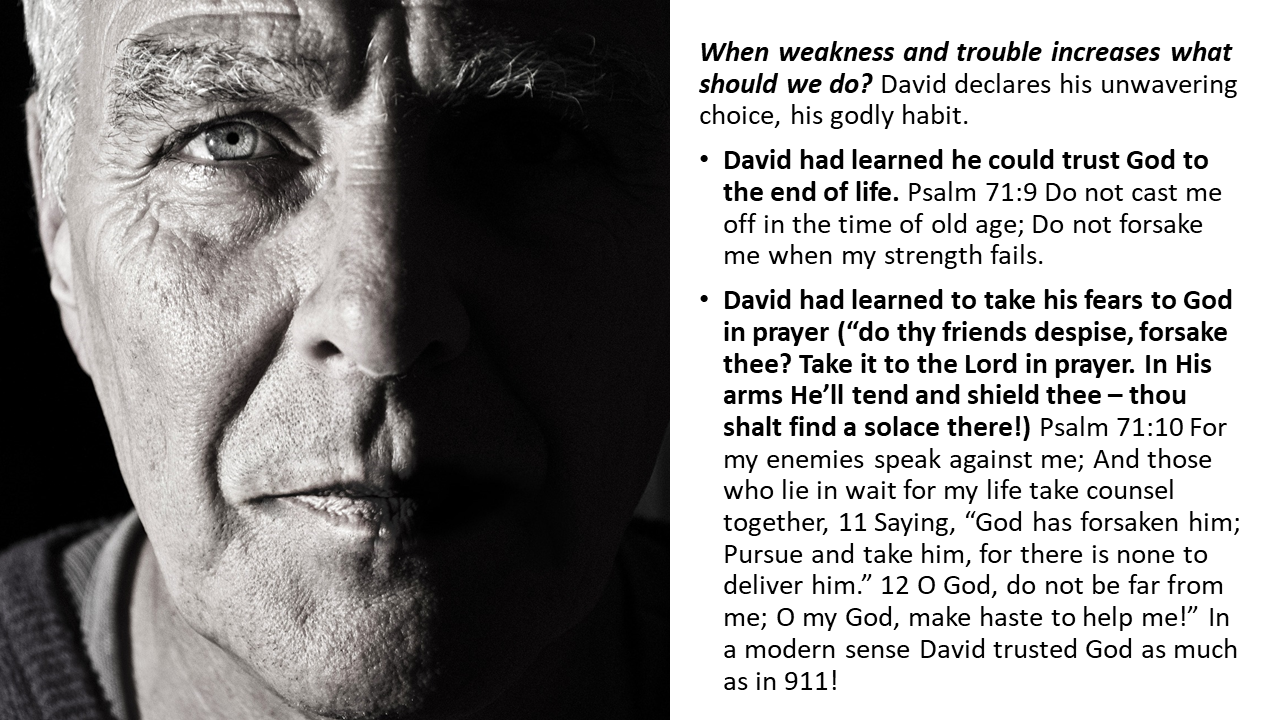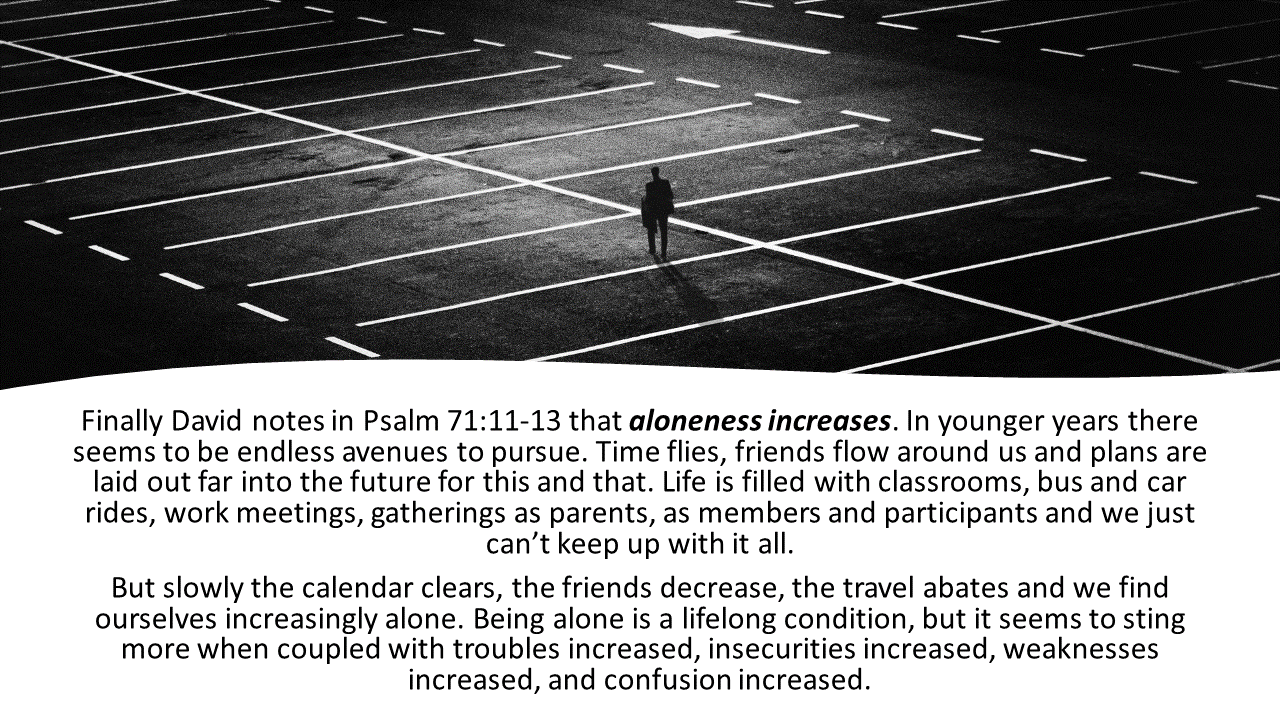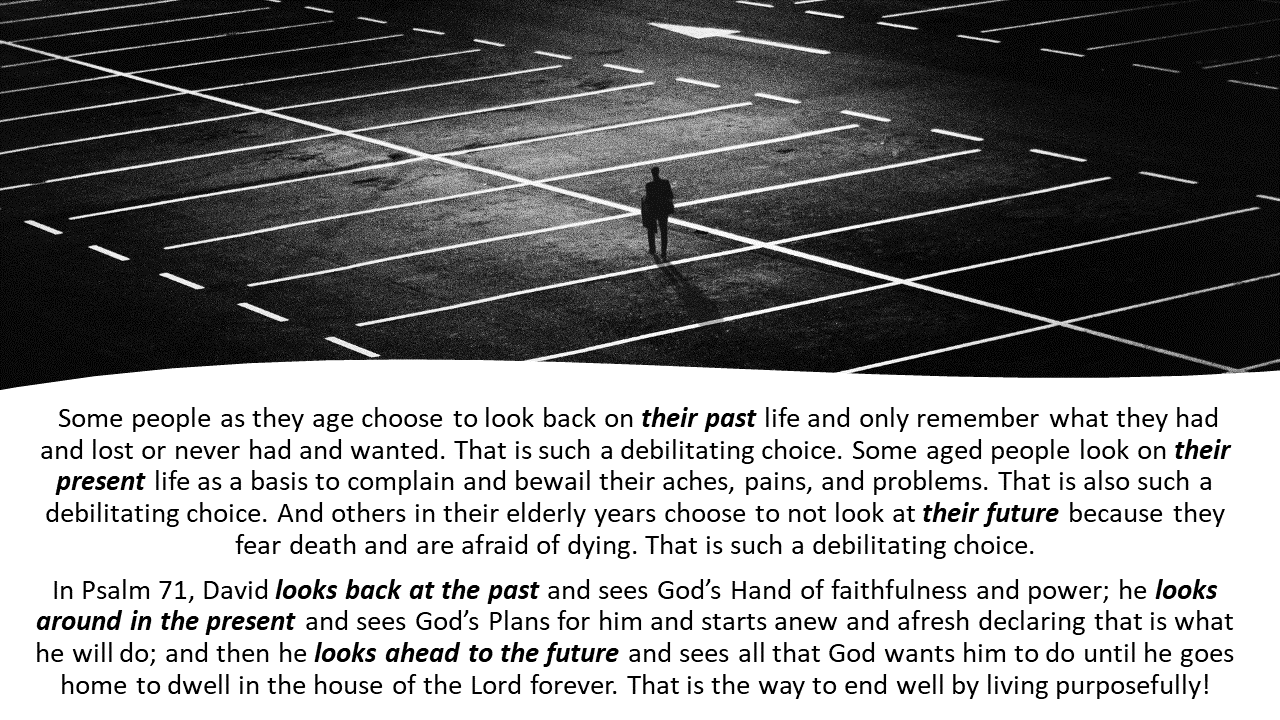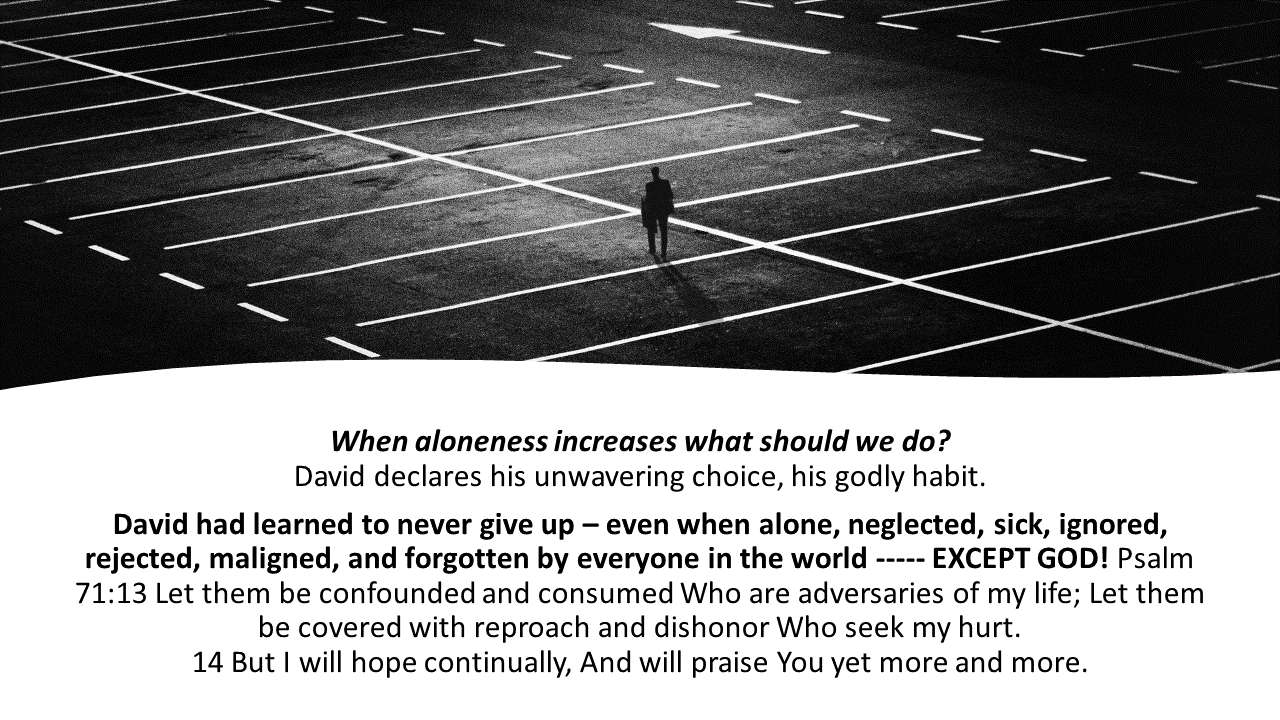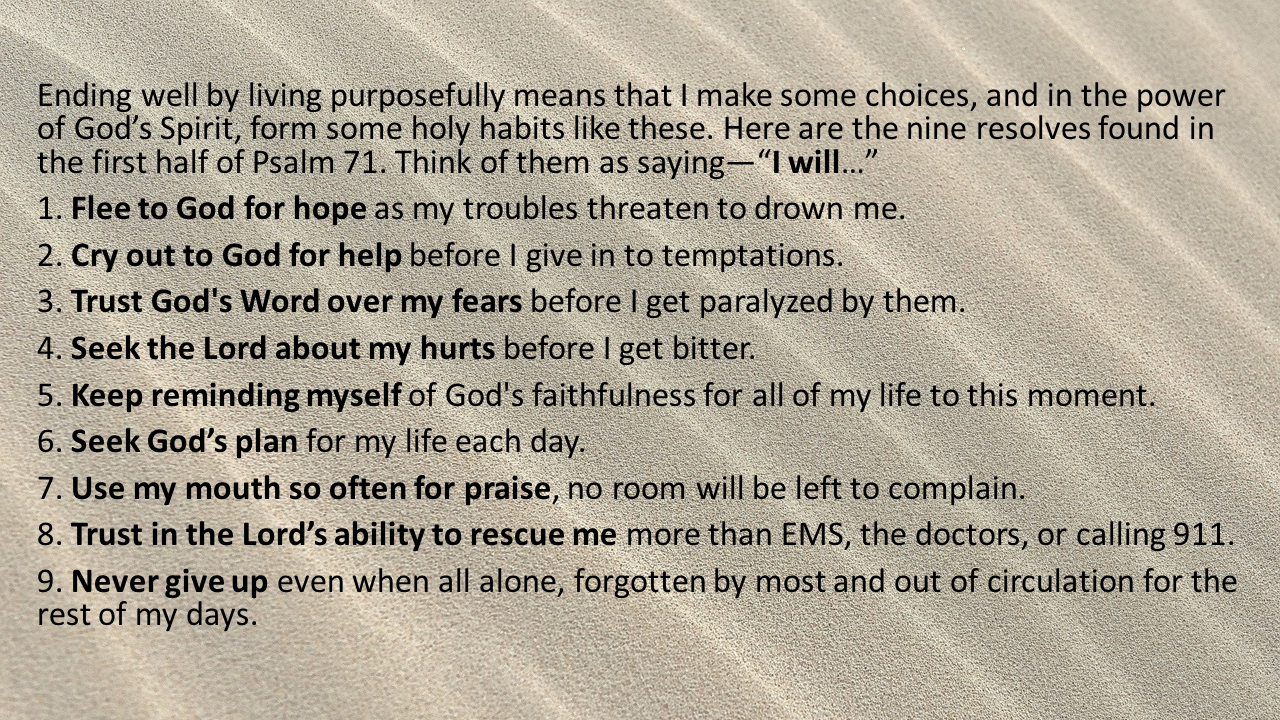David – Ending Well
061008AM
BIO-11 DSS-41
David–Living Purposefully Psalm 71
David: Ending Well by— Living Purposefully
Psalm 71
 Jesus gave all of us something to look forward to. He told us what He would like to say to each of us when we arrive safely home to dwell with Him forever–“Well done good and faithful servant”!
Jesus gave all of us something to look forward to. He told us what He would like to say to each of us when we arrive safely home to dwell with Him forever–“Well done good and faithful servant”!
Christ’s well done is what any of us would call, ending well.
As you open to the 71st Psalm, you are opening to the words of someone who ended well. God’s prompts them to pause and look back over their life. They are old, have already lived through so much pain—and now are facing the weaknesses of old age, its challenges, blessings and curses.
But the key to finishing life, or ending well is the long term cultivation of godly habits.
Life is a constant stream of choices. Each choice we make has a consequence. The consequences of godly habits are good, the consequences of ungodly habits are bad. Life is really that simple and David in our Psalm this morning knows that.
Reading Psalm 71 is probably listening to the voice of God pointing out David’s resolves for life.
But if it isn’t David the only other authors that may be the ones God used are Samuel and Jeremiah. If it was Samuel then again it was most likely David who captured these thoughts from his wonderful mentor and friend and put them down on parchment to sing of God’s Great Faithfulness. If it was Jeremiah then there is also a hint of the troubles Jeremiah confesses in Lamentations combined with the hope Lamentations 3:23 which declares Great is Thy Faithfulness.
David is the strongest case for authorship and almost universally agreed upon from ancient times. The Bible of Christ’s day called the Septuagint says so, as do most Jewish sources. In the Hebrew Bible Psalm 71 is joined to Psalm 70 also written by David. Also the first three verses of Psalm 71 are taken directly from Psalm 31 which David wrote while fleeing from Absalom.
Most amazing though is the fact that Psalm 71 quotes over 50 times from 26 other Psalms, 18 of which are Psalms that David wrote. This Psalm quotes Psalms 3, 5, 7, 18, 22, 23, 31, 32, 34-36, 40, 51, 56, 57, 60, 63, and 86. So we would conclude it is written by David.
So no matter what channel God chose to deliver this Psalm, it is a powerful testimony to the God we can trust in all seasons of life. And even at our weakest times, when age, infirmity and incapacity are mounting—even then our great God is faithful and will not fail us even when we fail Him.
But there is even more than just a strong comfort for the years ahead in this Psalm, Psalm 71 is also the distillation and crystallization of some underlying resolves or purposes that David had learned to live by in his long and eventful life.
Much like the books written by the titans of business and finance that give the leadership “secrets” and principles that drove these men and women to great successes in their careers—Psalm 71 is David’s testimony guided by the Mighty Hand of God, through the Infinite Spirit of God of what in life is worth repeating.
David distills the purposes of his life. David confesses those underlying truths that guided him well and keep him strong no matter what else he faces to the end of life.
So even if you are young and the weaknesses of old age are far away—this Psalm has something for you too. It is the call to live life intentionally, to live each day purposefully so that when the days speed by and life is getting short you and I can say that we are ending well because we have lived purposefully.
Please stand with me as we read the first half of Psalm 71 verses 1-13 and then pray.
We live in an aimless culture driven by the latest fads and events. We also can see trends in the church by the fads and events that we as believers reflect. One trend that I watch is what books make big splashes. If you step back, best selling books among Christians are indicators of needs and desires that permeate the personal lives of believers. That is why some mega-selling Christian books point to deeper needs being expressed.
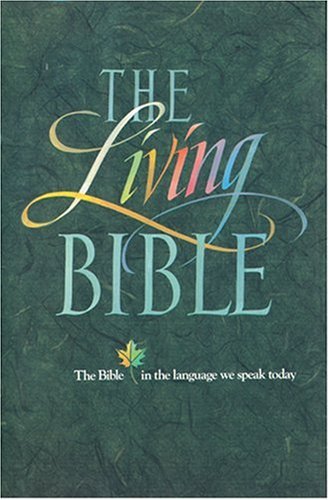 Just for example let me point out five of the biggest selling books, written by believers, of the last thirty years. No matter what you may think about the authors or their books—they do reveal where believers are in their spiritual pilgrimages.
Just for example let me point out five of the biggest selling books, written by believers, of the last thirty years. No matter what you may think about the authors or their books—they do reveal where believers are in their spiritual pilgrimages.
- In 1971, Ken Taylor’s Living Bible selling over 40 million copies, was a big statement that many people really wanted to understand the Bible.
- The same year, Hal Lindsey’s Late Great Planet Earth that sold 28 million copies was an indicator that many believers also wanted to understand the future as God had laid it out in His Word.
- In 1995, Tim La Haye’s Left Behind Series was a renewed statement of a new generation of people wanting to know what God’s Word says about the future, selling over 62 million copies and counting.
- Likewise the surprise of the year 2000 was Bruce Wilkinson’s book The Prayer of Jabez that overnight sold over 13 million copies; those sales were a cry from many believers that they really wanted to experience prayer. This summer at a Bible conference I spoke at a woman stood at the final meeting and gave a public testimony. She said I have been praying the Prayer of Jabez over my family for years but now I have verses from the Bible to use to focus my prayers for my family.
- And finally, in recent years Rick Warren’s Purpose Driven Life released in 2002 and selling an astonishing 24 million copies is a statement that many people are really interested in finding out how to live life for what matters to God.
And the best selling book in all the history of the world, God’s Word the Bible gives us the truth we need to answer these and any other of the deepest cries of our hearts.
The 71st Psalm first of all contains some of the realities that come with life on planet earth. Life has a collection of problems or troubles that are always with us. Either we are just getting through some, just in the middle of some, or just headed into some— troubles! Man is born for troubles as sure as the sparks in a campfire rise up in the smoke and heat, Job told us almost five thousand years ago.
So every day we have a choice to either focus on ourselves–my troubles, my problems, my misfortunes, my woes (and there will always be some); or to focus on God–His plans, His promises, His purposes and His Faithfulness to guide our lives to the end.
Someone has well said that life is not really mountains and valleys where we have all good times (mountains) and all bad times (valleys); rather life is more life a parallel line of railroad tracks. One side is my own personal set of burdens, weakness, problems, and troubles. The other side is all of God’s goodness, His promised faithfulness, His perfect plans and purposes He is working out in my life.
God wants us to look at life with all its struggles, through the lens of His Word. He wants us to see Him and His plans being worked out in our life as we go through each day. That is exactly what David shows us in this Psalm.
So this morning, in Psalm 71 David first surveys the challenges that will face each of us as we get older. He reflects these problems of getting older in a series of verses that blend together God’s Faithfulness and promises with each of those troubles.
David begins this Psalm noting the unending struggles that lie ahead for most of us.
 First, in Psalm 71:1-2 David reminds us that as we get older confusion increases. The older we get, the slower our minds, the easier it is to get confused. Life moves fast, we are slowing and our minds and bodies can’t keep us the pace at times. This prompts confusion. Too many choices, too fast a pace and too short a period to process all of the above makes for a freezing up of the ability to make a decision and thus confusion as to what to do.
First, in Psalm 71:1-2 David reminds us that as we get older confusion increases. The older we get, the slower our minds, the easier it is to get confused. Life moves fast, we are slowing and our minds and bodies can’t keep us the pace at times. This prompts confusion. Too many choices, too fast a pace and too short a period to process all of the above makes for a freezing up of the ability to make a decision and thus confusion as to what to do.
When confusion increases what should we do? David declares his unwavering choice, his godly habit.
• David had learned to flee to the Lord instead of living in confusion. Psalm 71:1 In thee, O LORD, do I put my trust: let me never be put to confusion.
• David had learned to cry to the Lord before giving up to troubles. Psalm 71:2 Deliver me in Your righteousness, and cause me to escape; Incline Your ear to me, and save me.
Secondly, another challenge of growing older David points out is in Psalm 71:3-8 where he reminds us that insecurity increases. Like confusion, insecurity shows up here and there from childhood, it just gets bigger and bigger the older, weaker we get. Older people feel like they are no longer needed, and often that they are in the way. Combined with all the weaknesses of life that breeds increased insecurity.
David warns us that God will not allow us to persist in the enticing sins of old age: a lust for comfort and convenience, a greed for recognition and covetousness for security. God uses David to remind us that the sins of old age can erase Christ’s well done. We should remember Solomon who started well and failed in the end because he refused to obey God at the end of his life.
All of these increasing insecurities of old age are prompted by fears. Like the Fear of Pain, the Fear of Abandonment or Rejection, the Fear of Death, the Fear of Losing Control, the Fear of Failure, the Fear of the Future, the Fear of Shame and Embarrassment, the Fear of Strangers, the Fear of Loss, the Fear of What People Think of You, and the Fear of Aging.
How does God deliver us from fear? God wants to deliver us by a greater fear—the Fear of God. And what is the fear of the Lord? Below is a description of what the fear of the Lord means, distilled from references to the fear of the Lord that appear throughout Psalms.
1. Having reverence and respect for God as the all-powerful Leader of all else.
2. Having certainty of inescapable accountability for behavior to God.
3. Practicing the personal awareness of the presence of a Holy God.
4. Humbly following His leadership by obeying His Word. 1
When insecurity increases what should we do? David declares his unwavering choice, his godly habit.
• David had learned to resist fear by running into God’s Refuge – thus trusting God’s Word more than his fears. Psalm 71:3 Be my strong refuge, To which I may resort continually; You have given the commandment to save me, For You are my rock and my fortress.
• David had learned to ask for God’s help before he became bitter. Psalm 71:4 Deliver me, O my God, out of the hand of the wicked, Out of the hand of the unrighteous and cruel man.
• David had learned to keep remembering the faithfulness of God. Psalm 71:5 For You are my hope, O Lord God; You are my trust from my youth.
• David had learned to remember to praise God that He had a plan for his life. Psalm 71:6 By You I have been upheld from birth; You are He who took me out of my mother’s womb. My praise shall be continually of You.
• David had learned to let his life be a testimony for the Lord. Psalm 71:7 I have become as a wonder to many, But You are my strong refuge.
• David had learned to praise God so much — no time was left for complaints. Psalm 71:8 Let my mouth be filled with Your praise And with Your glory all the day.
 Thirdly, David also notes in Psalm 71:9 that weakness increases as we grow older. How true this is. Finances decrease and deplete as does physical strength, emotional strength, mental strength. Our senses dim, our minds dull, and our hopes diminish. Everything in our physical world weakens from bones to teeth, from to circulation to stamina, and sight to hearing. There is nothing in our physical world that escapes the slow or rapid decline.
Thirdly, David also notes in Psalm 71:9 that weakness increases as we grow older. How true this is. Finances decrease and deplete as does physical strength, emotional strength, mental strength. Our senses dim, our minds dull, and our hopes diminish. Everything in our physical world weakens from bones to teeth, from to circulation to stamina, and sight to hearing. There is nothing in our physical world that escapes the slow or rapid decline.
John Wesley (1703-1791) a giant among the 18th century’s servants of the Lord, wrote this on his 86th birthday in a diary he kept for most of his adult life:
June 28. This day I enter on my eighty-sixth year. I now find I grow old:
1. My sight is decayed, so that I cannot read a small print, unless in a strong light.
2. My strength is decayed, so that I walk much slower than I did some years since.
3. My memory of names, whether of persons, or places, is decayed, till I stop a little to recollect them.
What I should be afraid of, is, if I took thought for the morrow, that my body should weigh down my mind, and create either stubbornness, by the decrease of my understanding, or peevishness, by the increase of bodily infirmities; But thou shalt answer for me, O Lord my God. John Wesley.
Another realm David mentions in Psalm 71:10 is that he sees that trouble increases. David notes that his enemies were as much present at the end of his life as they were at the start and throughout. So we also discover the older we get. From troubles with mobility to troubles with relationships, life just fills with troubles. It becomes hard to get up, hard to get around, hard to sleep, hard to hear, hard to remember and hard to trust.
Anxiety seems easily accessed, bitterness seems near at hand, and fears seem to multiply. Enemies imagined and enemies experienced all run together.
There are emotional troubles (some struggle with life long depression), financial troubles (some have constant financial needs and hardships), family troubles (some have hurtful children or burdensome and ungrateful parents for many years)—all of these troubles are heavier to bear the weaker we get.
When weakness and trouble increases what should we do? David declares his unwavering choice, his godly habit.
• David had learned he could trust God to the end of life. Psalm 71:9 Do not cast me off in the time of old age; Do not forsake me when my strength fails.
• David had learned to take his fears to God in prayer (“do thy friends despise, forsake thee? Take it to the Lord in prayer. In His arms He’ll tend and shield thee – thou shalt find a solace there!) Psalm 71:10 For my enemies speak against me; And those who lie in wait for my life take counsel together, 11 Saying, “God has forsaken him; Pursue and take him, for there is none to deliver him.” 12 O God, do not be far from me; O my God, make haste to help me!” In a modern sense David trusted God as much as in 911!
Finally David notes in Psalm 71:11-13 that aloneness increases. In younger years there seems to be endless avenues to pursue. Time flies, friends flow around us and plans are laid out far into the future for this and that. Life is filled with classrooms, bus and car rides, work meetings, gatherings as parents, as members and participants and we just can’t keep up with it all.
But slowly the calendar clears, the friends decrease, the travel abates and we find ourselves increasingly alone. Being alone is a lifelong condition, but it seems to sting more when coupled with troubles increased, insecurities increased, weaknesses increased, and confusion increased.
Some people as they age choose to look back on their past life and only remember what they had and lost or never had and wanted. That is such a debilitating choice. Some aged people look on their present life as a basis to complain and bewail their aches, pains, and problems. That is also such a debilitating choice. And others in their elderly years choose to not look at their future because they fear death and are afraid of dying. That is such a debilitating choice.
In Psalm 71, David looks back at the past and sees God’s Hand of faithfulness and power; he looks around in the present and sees God’s Plans for him and starts anew and afresh declaring that is what he will do; and then he looks ahead to the future and sees all that God wants him to do until he goes home to dwell in the house of the Lord forever. That is the way to end well by living purposefully!
When aloneness increases what should we do? David declares his unwavering choice, his godly habit.
 David had learned to never give up – even when alone, neglected, sick, ignored, rejected, maligned, and forgotten by everyone in the world —– EXCEPT GOD! Psalm 71:13 Let them be confounded and consumed Who are adversaries of my life; Let them be covered with reproach and dishonor Who seek my hurt. 14 But I will hope continually, And will praise You yet more and more.
David had learned to never give up – even when alone, neglected, sick, ignored, rejected, maligned, and forgotten by everyone in the world —– EXCEPT GOD! Psalm 71:13 Let them be confounded and consumed Who are adversaries of my life; Let them be covered with reproach and dishonor Who seek my hurt. 14 But I will hope continually, And will praise You yet more and more.
This evening we will see that in Psalm 71:14-24 David shifts his focus from his troubles of life and turns the spotlight on that other track of life. In the first 13 verses David uses the present tense 23 times2. But in those final verses David uses the future tense 12 times in 11 verses! He declares his intentions in a “from now on I will” form saying—I will trust, I will rest, I will believe in the God who has promised to care for me. God is faithful in the past, for the future and most of all in this present moment.
But what does it mean to end well? Is it being healthy to the last breath? No. Does it mean being surrounded by comforts to the last moments? No. Does it mean getting everything done that we wanted to do? No.
Ending well is defined by David as being able to keep that focus on the other rail that we travel through life upon—God’s plans for us that are good, God’s promises that are sure, and God’s Presence that is real.
May I remind you of a fellow believer who ended well? David Livingstone (1813-1873) had come to the end of his life. He was deep in the swamps of Africa, alone with a few native carriers. His feet were covered with bleeding ulcers, his body was completely exhausted, he was bleeding internally and as a doctor he knew his end was near. In his journal his last entry was simply: “Knocked up quite”. But he was not alone and he knew it. A lifetime of godly habits led him to still end his day in prayer no matter how ill he felt.
As the darkness fell over that swamp that night, the shadow of a sixty-year-old man was silhouetted against the canvas of his tent. The flickering candle cast a golden aura inside as he knelt beside a small wood and canvas cot. Rhythmic tropical rain lightly pelted the tent as he prayed beside his bed. The prayer was one he had written out in his journal the many years before. If you were able to hear that night what God heard it would have sounded much like this:
O Lord since Thou hast died, To give Thyself for me, No sacrifice would seem to great, For me to make for Thee.
I only have one life, and that will soon be past; I want my life to count for Christ, What’s done for Him will last.
I follow Thee my Lord, And glory in Thy Cross; I gladly leave the world behind, And count all gain as loss.
Lord send me anywhere, Only go with me; Lay any burden on me, Only sustain me. Sever any tie, Save the tie that binds me to Thy heart. Lord Jesus my King, I consecrate my life Lord to Thee!
Outside the native porters, guides and cooks who had followed this man for nearly 20 years through the jungle heard the low sound of his voice communing with God as he always had done before bed. Then the candle flickered out and they also retired to sleep through the rainy night.
The next morning the cold and stiff body of David Livingstone was still kneeling beside the cot when his beloved native brothers found him. He was so thin from the countless bouts with malaria, his skin darkened by the years of Equatorial African sun was loosely draped over the bones of his earthly tent now vacant. His spirit had soared immortal, making its flight from the darkness of a disease ridden, weak and failing body to the realm of light and life in the presence of Jesus his King to whom he had consecrated his life.
That is ending well.
It has nothing to do with comfort, health or security. It has everything to do with godly habits empowered by the Holy Spirit. Had God let David Livingstone down by allowing him to die alone, sick, and in such desperate conditions? No, a thousand times no! Into that tiny tent as Livingstone weakly knelt by his tiny cot the Good Shepherd had come to take His faithful servant home. As David Livingstone prayed those gentle everlasting arms had wrapped around him, and into his ears were whispered I will never leave you or forsake you. And then David Livingstone heard Him say, it is time for you to come home. I’ll carry you there, we’ll go through that valley of darkness, but don’t fear any evil because I am with you. You are coming to dwell in my house forever. Well done My good and faithful servant!
David Livingstone looked at life through the lens of Scripture. He believed God, trusted His Word and found both to be true every time he tested them. Livingstone looked at all his pains and struggles as part of God’s plan. That’s why after his faithful friends, the native porters, carried his body 1,500 miles to the coast and sent it by steamer back to England. That is why one of them stood at his funeral in Westminster Abbey. And that is why these words were engraved upon Livingstone’s tomb stone:
“For thirty years his life was spent in an unwearied effort to evangelize the native races, to explore the undiscovered secrets, to abolish the desolating slave trade of Central Africa.”3
So we conclude that Psalm 71 is David’s prayer and testimony of how to be a godly servant of the Lord to the end of life.
We don’t know how long before our Master returns. Jesus said we must do His work until He comes. The best way to do that is to start living right now the way we want to have Him find us at the end when He comes (rapture) or calls (death). I call this some specific Plans for Growing Old in Godliness. These can all be found in Psalm 71. Let’s conclude there.
Ending well by living purposefully means that I make some choices, and in the power of God’s Spirit, form some holy habits like these. Here are the nine resolves found in the first half of Psalm 71. Think of them as saying—“I will…”
1. Flee to God for hope as my troubles threaten to drown me.
2. Cry out to God for help before I give in to temptations.
3. Trust God’s Word over my fears before I get paralyzed by them.
4. Seek the Lord about my hurts before I get bitter.
5. Keep reminding myself of God’s faithfulness for all of my life to this moment.
6. Seek God’s plan for my life each day.
7. Use my mouth so often for praise, no room will be left to complain.
8. Trust in the Lord’s ability to rescue me more than EMS, the doctors, or calling 911.
9. Never give up even when all alone, forgotten by most and out of circulation for the rest of my days.
Psalm 71 Other Psalms v. 1-3 Psalm 31:1-3 1 In You, O Lord, I put my trust; Let me never be ashamed; Deliver me in Your righteousness. Bow down Your ear to me, Deliver me speedily; Be my rock of refuge, A fortress of defense to save me. 3 For You are my rock and my fortress; Therefore, for Your name’s sake, Lead me and guide me.
v.3 Psalm 71:3 Be my strong refuge, To which I may resort continually; You have given the commandment to save me, For You are my rock and my fortress.
Psalm 90:1 A Prayer of Moses the man of God. 1 Lord, You have been our dwelling place in all generations.
Psalm 91:9 Because you have made the Lord, who is my refuge, Even the Most High, your dwelling place,
Psalm 7:6 Arise, O Lord, in Your anger; Lift Yourself up because of the rage of my enemies; Rise up for me to the judgment You have commanded!
Psalm 42:8 The Lord will command His lovingkindness in the daytime, And in the night His song shall be with me—A prayer to the God of my life.
Psalm 18:2 The Lord is my rock and my fortress and my deliverer; My God, my strength, in whom I will trust; My shield and the horn of my salvation, my stronghold.
v.4 Psalm 71:4 Deliver me, O my God, out of the hand of the wicked, Out of the hand of the unrighteous and cruel man.
Psalm 140:1, 4 To the Chief Musician. A Psalm of David. 1 Deliver me, O Lord, from evil men; Preserve me from violent men, 4 Keep me, O Lord, from the hands of the wicked; Preserve me from violent men, Who have purposed to make my steps stumble.
v.5 Psalm 71:5 For You are my hope, O Lord God; You are my trust from my youth.
Psalm 39:7 “And now, Lord, what do I wait for? My hope is in You.
Psalm 22:9 But You are He who took Me out of the womb; You made Me trust while on My mother’s breasts.
v.6 Psalm 71:6 By You I have been upheld from birth; You are He who took me out of my mother’s womb. My praise shall be continually of You.
Psalm 22:9-10 But You are He who took Me out of the womb; You made Me trust while on My mother’s breasts.10 I was cast upon You from birth. From My mother’s womb You have been My God.
Psalm 34:1 A Psalm of David when he pretended madness before Abimelech, who drove him away, and he departed. 1 I will bless the Lord at all times; His praise shall continually be in my mouth.
v.7 Psalm 71:7 I have become as a wonder to many, But You are my strong refuge.
Psalm 61:3 For You have been a shelter for me, A strong tower from the enemy.
v.8 Psalm 71:8 Let my mouth be filled with Your praise And with Your glory all the day.
salm 63:5 My soul shall be satisfied as with marrow and fatness, And my mouth shall praise You with joyful lips.
Psalm 96:6 Honor and majesty are before Him; Strength and beauty are in His sanctuary.
Psalm 104:1 Bless the Lord, O my soul! 1 O Lord my God, You are very great: You are clothed with honor and majesty,
v.9 Psalm 71:9 Do not cast me off in the time of old age; Do not forsake me when my strength fails.
Psalm 92:14 They shall still bear fruit in old age; They shall be fresh and flourishing,
v.10 Psalm 71:10 For my enemies speak against me; And those who lie in wait for my life take counsel together,
Psalm 56:6 They gather together, They hide, they mark my steps, When they lie in wait for my life.
Psalm 31:13 For I hear the slander of many; Fear is on every side; While they take counsel together against me, They scheme to take away my life.
Psalm 83:3 They have taken crafty counsel against Your people, And consulted together against Your sheltered ones.
v.11 Psalm 71:11 11 Saying, “God has forsaken him; Pursue and take him, for there is none to deliver him.”
Psalm 3:2 Many are they who say of me, “There is no help for him in God.” Selah
Psalm 7:2 Lest they tear me like a lion, Rending me in pieces, while there is none to deliver.
v.12 Psalm 71:12 O God, do not be far from me; O my God, make haste to help me!
Psalm 10:1 Why do You stand afar off, O Lord? 1 Why do You hide in times of trouble?
Psalm 22:11, 19 Be not far from Me, For trouble is near; For there is none to help.
19 But You, O Lord, do not be far from Me; O My Strength, hasten to help Me!
Psalm 35:22 This You have seen, O Lord; Do not keep silence. O Lord, do not be far from me.
Psalm 38:21-22 Do not forsake me, O Lord; O my God, be not far from me! 22 Make haste to help me, O Lord, my salvation!
Psalm 40:13 Be pleased, O Lord, to deliver me; O Lord, make haste to help me!
v.13 Psalm 71:13 Let them be confounded and consumed Who are adversaries of my life; Let them be covered with reproach and dishonor Who seek my hurt.
Psalm 35:4, 26 Let those be put to shame and brought to dishonor Who seek after my life; Let those be turned back and brought to confusion Who plot my hurt. 26 Let them be ashamed and brought to mutual confusion Who rejoice at my hurt; Let them be clothed with shame and dishonor
Psalm 40:14 Let them be ashamed and brought to mutual confusion Who seek to destroy my life; Let them be driven backward and brought to dishonor Who wish me evil.
Psalm 109:29 Let my accusers be clothed with shame, And let them cover themselves with their own disgrace as with a mantle. Who exalt themselves against me.
v.14 Psalm 71:14 14 But I will hope continually, And will praise You yet more and more.
Psalm 130:7 O Israel, hope in the Lord; For with the Lord there is mercy, And with Him is abundant redemption.
v.15 Psalm 71:15 My mouth shall tell of Your righteousness And Your salvation all the day, For I do not know their limits.
Psalm 35:28 And my tongue shall speak of Your righteousness And of Your praise all the day long.
Psalm 96:2 Sing to the Lord, bless His name; Proclaim the good news of His salvation from day to day.
Psalm 40:5 Many, O Lord my God, are Your wonderful works Which You have done; And Your thoughts toward us Cannot be recounted to You in order; If I would declare and speak of them, They are more than can be numbered.
v.16 Psalm 71:16 16 I will go in the strength of the Lord God; I will make mention of Your righteousness, of Yours only.
Psalm 106:2 Who can utter the mighty acts of the Lord? Who can declare all His praise?
Psalm 51:14 Deliver me from the guilt of bloodshed, O God, The God of my salvation, And my tongue shall sing aloud of Your righteousness.
v.17 Psalm 71:17 O God, You have taught me from my youth; And to this day I declare Your wondrous works.
Psalm 26:7 That I may proclaim with the voice of thanksgiving, And tell of all Your wondrous works.
Psalm 40:5 Many, O Lord my God, are Your wonderful works Which You have done; And Your thoughts toward us Cannot be recounted to You in order; If I would declare and speak of them, They are more than can be numbered.
Psalm 119:27 Make me understand the way of Your precepts; So shall I meditate on Your wondrous works.
v.18 Psalm 71:18 18 Now also when I am old and grayheaded, O God, do not forsake me, Until I declare Your strength to this generation, Your power to everyone who is to come.
Psalm 32:11 Be glad in the Lord and rejoice, you righteous; And shout for joy, all you upright in heart!
Psalm 78:4, 6 We will not hide them from their children, Telling to the generation to come the praises of the Lord, And His strength and His wonderful works that He has done. 5 For He established a testimony in Jacob, And appointed a law in Israel, Which He commanded our fathers, That they should make them known to their children; 6 That the generation to come might know them, The children who would be born, That they may arise and declare them to their children,
v.19 Psalm 71:19 19 Also Your righteousness, O God, is very high, You who have done great things; O God, who is like You?
Psalm 36:6 Your righteousness is like the great mountains; Your judgments are a great deep; O Lord, You preserve man and beast.
Psalm 57:10 For Your mercy reaches unto the heavens, And Your truth unto the clouds.
Psalm 126:2 Then our mouth was filled with laughter, And our tongue with singing. Then they said among the nations, “The Lord has done great things for them.”
Psalm 35:10 All my bones shall say, “Lord, who is like You, Delivering the poor from him who is too strong for him, Yes, the poor and the needy from him who plunders him?”
v.20 Psalm 71:20 20 You, who have shown me great and severe troubles, Shall revive me again, And bring me up again from the depths of the earth.
Psalm 60:3 You have shown Your people hard things; You have made us drink the wine of confusion.
Psalm 80:18 Then we will not turn back from You; Revive us, and we will call upon Your name.
Psalm 85:6 Will You not revive us again, That Your people may rejoice in You?
Psalm 119:25 My soul clings to the dust; Revive me according to Your word.
Psalm 138:7 Though I walk in the midst of trouble, You will revive me; You will stretch out Your hand Against the wrath of my enemies, And Your right hand will save me.
Psalm 86:13 For great is Your mercy toward me, And You have delivered my soul from the depths of Sheol.
v.21 Psalm 71:21 21 You shall increase my greatness, And comfort me on every side.
Psalm 18:35 35 You have also given me the shield of Your salvation; Your right hand has held me up, Your gentleness has made me great.
Psalm 23:4 4 Yea, though I walk through the valley of the shadow of death, I will fear no evil; For You are with me; Your rod and Your staff, they comfort me.
Psalm 86:17 Show me a sign for good, That those who hate me may see it and be ashamed, Because You, Lord, have helped me and comforted me.
v.22 Psalm 71:22 Also with the lute I will praise you— And Your faithfulness, O my God! To You I will sing with the harp, O Holy One of Israel.
Psalm 33:2 Praise the Lord with the harp; Make melody to Him with an instrument of ten strings.
Psalm 81:2 Raise a song and strike the timbrel, The pleasant harp with the lute.
Psalm 144:9 I will sing a new song to You, O God; On a harp of ten strings I will sing praises to You,
Psalm 147:7 Sing to the Lord with thanksgiving; Sing praises on the harp to our God,
Psalm 78:41 Yes, again and again they tempted God, And limited the Holy One of Israel.
Psalm 89:18 For our shield belongs to the Lord, And our king to the Holy One of Israel.
v.23 Psalm 71:23 23 My lips shall greatly rejoice when I sing to You, And my soul, which You have redeemed.
Psalm 5:11 But let all those rejoice who put their trust in You; Let them ever shout for joy, because You defend them; Let those also who love Your name Be joyful in You.
Psalm 32:11 Be glad in the Lord and rejoice, you righteous; And shout for joy, all you upright in heart!
Psalm 132:9, 16 Let Your priests be clothed with righteousness, And let Your saints shout for joy. 16 I will also clothe her priests with salvation, And her saints shall shout aloud for joy.
Psalm 34:22 The Lord redeems the soul of His servants, And none of those who trust in Him shall be condemned.
Psalm 55:18 He has redeemed my soul in peace from the battle that was against me, For there were many against me.
Psalm 103:4 Who redeems your life from destruction, Who crowns you with lovingkindness and tender mercies,
v.24 Psalm 71:24 24 My tongue also shall talk of Your righteousness all the day long; For they are confounded, For they are brought to shame Who seek my hurt.
Psalm 35:28 And my tongue shall speak of Your righteousness And of Your praise all the day long.
1 Jan David Hettinga, Follow Me: Experience The Loving Leadership of Jesus, (Colorado Springs, Co: NavPress, 1996, Pages 193194 and 218-219.
2 This morning look back and note in your Bible these 23-present tense requests David makes in Psalm 71:1-13, that flow from living each day aware that God is working out His plan through the struggles of life v.13a.
1. v.1a In You, O Lord, I put my trust;
2. v.1b Let me never be put to shame.
3. v.2a Deliver me in Your righteousness,
4. v.2b and cause me to escape;
5. v.2c Incline Your ear to me,
6. v.2d and save me.
7. v.3a Be my strong refuge,
8. v.3b To which I may resort continually;
9. v.3c You have given the commandment to save me, For You are my rock and my fortress.
10. v.4 Deliver me, O my God, out of the hand of the wicked, Out of the hand of the unrighteous and cruel man.
11. v.5a For You are my hope, O Lord God;
12. v.5b You are my trust from my youth.
13. v.6a By You I have been upheld from birth;
14. v.6b You are He who took me out of my mother’s womb.
15. v.6c My praise [is( NASB)] shall be continually of You.
16. v.7 I have become as a wonder to many, But You are my strong refuge.
17. v.8 Let my mouth be filled with Your praise And with Your glory all the day.
18. v.9 Do not cast me off in the time of old age; Do not forsake me when my strength fails. 10 For my enemies speak against me; And those who lie in wait for my life take counsel together, 11 Saying, “God has forsaken him; Pursue and take him, for there is none to deliver him.”
19. v.12a O God, do not be far from me;
20. v.12b O my God, make haste to help me!
21. v.13a Let them be confounded
22. v.13b and consumed Who are adversaries of my life;
23. v.13c Let them be covered with reproach and dishonor Who seek my hurt.
3 Douglas, J. D., Comfort, Philip W. & Mitchell, Donald, Editors, Who’s Who in Christian History, (Wheaton, Illinois: Tyndale House Publishers, Inc.) 1992, electronic edition, in loc
Slides
Check Out All The Sermons In The Series
You can find all the sermons and short clips from this series, David’s Spiritual Secret here.
You can find all the sermons and short clips from this series, Scriptural Biographies – Peter here.
Looking To Study The Bible Like Dr. Barnett?
Dr. Barnett has curated an Amazon page with a large collection of resources he uses in his study of God’s Word. You can check it out here.



